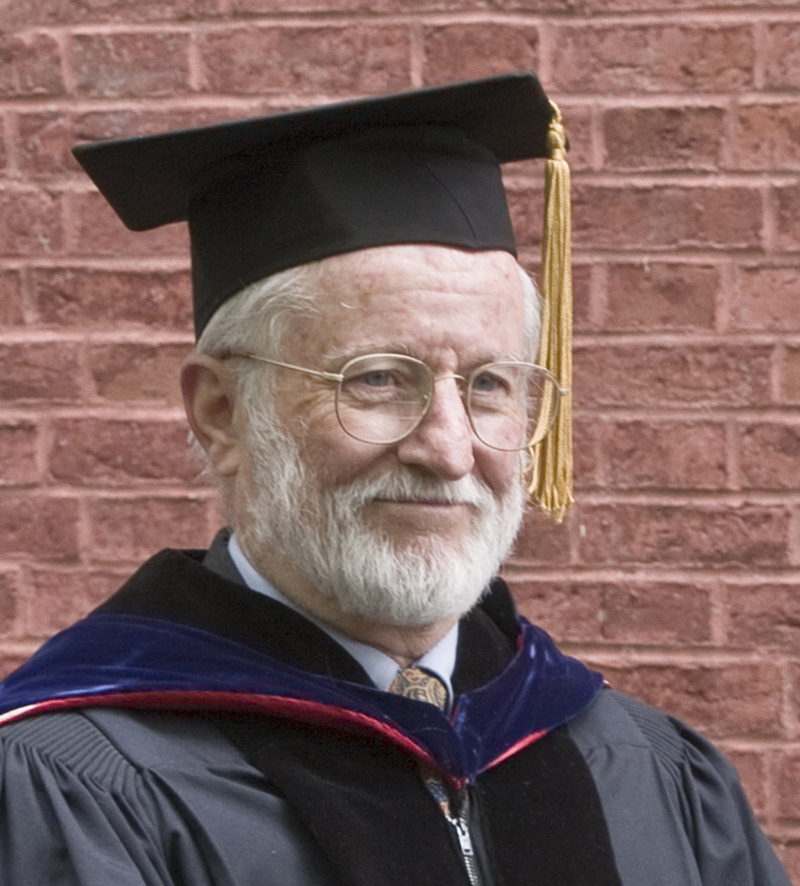Remembering Clifton Cooper Olds (1935–2021)
By Bowdoin College Museum of Art
Clifton C. Olds, Edith Cleaves Barry Professor of the History and Criticism of Art Emeritus, at Commencement in May 2008.
This is a slightly expanded version of the memorial tribute read on the faculty floor on April 27, 2021.
Clif arrived at Bowdoin in the early 1980s and those who worked with him the longest speak of his early years here as transformational, as he led the art department with a steady hand on the tiller—he was, after all, a sailor—making hires that would anchor the art history and visual arts programs right up until the present. In the words of one colleague, “he was the intellectual center and defining presence of the department for so many years.” In his two terms as Acting/Interim Director of the Museum, he played an equally steadying role and is remembered by Museum staff for the trust and respect he accorded everyone he worked with and the joy he brought to the work of sharing art with the campus and the larger public.
As I composed this tribute, I’ve had the sad but wonderful experience of hearing my colleagues’ memories of those many years. Nearly every one of them recalls the first time they met him, I think because he had a gift of making everyone he encountered feel instantly at ease—he radiated gentle good humor and warmth, he listened intently, and he was a brilliant conversationalist, moving effortlessly between Civil War history and sailing, philosophy and student bloopers, baseball and the history of art forgery. But it was never “small talk”: you instantly felt like you were talking to a trusted friend about the things that matter most.
Clif brought all of this—all of himself—to his teaching. His introductory courses on the histories of Western art and of East Asian art—a field he taught himself, including beginning the study of Japanese at the age of 60—were legendary, attracting as many as 200 students at a time. His grading was also legendary. Clif took his students’ writing seriously. He corrected every grammatical error and sometimes made peppery comments—“Your writing makes me wish I’d never learned to read” is still being repeated on former students’ Facebook pages. Though students feared his red pen, they also idolized him—because you knew that Clif saw you—even in the back row of a 200-person lecture—and he was never going to give you anything less than his full attention and respect.
His lectures were marvels of preparation, precision and delivery—each one a work of art. We recently rediscovered a recording of Clif teaching a class, masterfully weaving together his story about Leonardo though close observation of his drawings, reading them as “clues” to Leonardo’s paintings but also to the artist’s curiosity, his beliefs about humanity and the world. In 55 minutes he paints a picture of another mind and soul, and even watching in a scratchy old video, you can feel his absolute immersion in the moment and the rapt attention of the students. When Clif stopped speaking, I felt I knew Leonardo—and was in awe of his capacious knowledge, his hunger to understand the world and to share that understanding with others. Leonardo was, in other words, a Renaissance man—and so was Clif.
Which makes it more or less impossible in this short tribute to paint a full picture of him, his formidable brilliance and his equally deep kindness. So I’m going to turn to his example one more time, as all of us have done so often over the years. At one point in that lecture, Clif lists all of Leonardo’s identities, from botanist to philosopher, and I can’t think of a better way to close my short tribute than by following in his master story-teller’s footsteps. Clifton Cooper Olds. Connoisseur, Raconteur, Scholar, Musician, Teacher, Sailor, Curator, Digital Humanist, Artist, Father, Husband, Colleague, Mentor, and Friend. You will long be remembered with gratitude and love. May your memory be a blessing to us all.
Pamela M. Fletcher
Professor of Art History, Bowdoin College